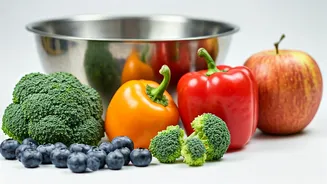Berry Burst Power
Berries are not just a treat for the taste buds; they also pack a powerful punch when it comes to health benefits. Studies show that berries, including
blueberries, strawberries, and raspberries, are loaded with antioxidants. These antioxidants may aid in combating cell damage that can lead to cancer. You can easily incorporate berries into your diet by adding them to your morning cereal, blending them into a smoothie, or simply enjoying them as a quick and healthy snack throughout the day. Consider combining them with yogurt or a handful of nuts to enhance the nutritional value and provide a satisfying snack. The vibrant colors and delicious flavors of berries make this a practical and enjoyable option.
Nuts and Seeds
Nuts and seeds represent another readily accessible and beneficial snack choice. Almonds, walnuts, chia seeds, and flaxseeds are rich in fiber, which is important for promoting digestive health and reducing the risk of colon cancer. The fiber content supports regular bowel movements and can help eliminate toxins from the body. Nuts and seeds also offer healthy fats and other vital nutrients that support overall well-being. Eating a small handful of these snacks between meals can help curb hunger and deliver essential nutrients. The versatility of nuts and seeds makes them easy to incorporate into many recipes, from salads to baked goods, or just as a tasty snack.
Yogurt Delights
Yogurt, especially varieties with active cultures or probiotics, provides significant health benefits, including a reduced risk of colon cancer. Probiotics promote a healthy balance of bacteria in the gut, which can contribute to better digestion and support the immune system. Certain types of yogurt are rich in calcium and vitamin D, both of which are linked to a lower risk of colorectal cancer. Choosing plain yogurt and adding your own toppings, such as berries or a sprinkle of nuts, allows you to control sugar intake and customize the snack. Enjoying yogurt can provide a delightful treat while also promoting better gut health.
Whole Grain Goodness
Whole grains are essential to a diet aimed at preventing colon cancer, and offer a great, convenient snack option. Foods such as whole-grain crackers, popcorn (air-popped, not buttered), and oatmeal provide a substantial amount of fiber. This fiber supports the digestive system and decreases the risk of developing colon cancer. Fiber helps in moving waste through the digestive system, reducing the time that potentially harmful substances are in contact with the colon lining. Make an effort to swap refined grains for whole grains for a healthier choice. The rich fiber content in whole grains can also promote feelings of fullness, helping manage weight and prevent overeating.
Broccoli Boost
Broccoli, a cruciferous vegetable, has a powerful reputation in the fight against cancer. It contains compounds like sulforaphane, known for its cancer-fighting properties. These compounds can help destroy cancer cells. Steaming or lightly cooking broccoli can preserve these nutrients, making it a valuable snack or side dish. Consider adding a squeeze of lemon or a sprinkle of herbs to enhance the flavor. Broccoli’s high fiber content also helps in digestion, supporting overall health. Regular consumption of broccoli can be a tasty and effective way of reducing the risk of colon cancer.
Avocado Advantage
Avocados offer healthy fats and a range of nutrients with potentially protective effects against colon cancer. These creamy fruits are rich in fiber and antioxidants. The fiber helps in improving digestion, while the antioxidants protect cells from damage. Avocados are also a source of monounsaturated fats, which are beneficial for heart health. You can eat avocado slices as a snack, add them to salads, or use them as a spread on whole-grain bread. This creamy, versatile fruit makes for a delicious and nutritious option, providing benefits that extend beyond just taste.
















